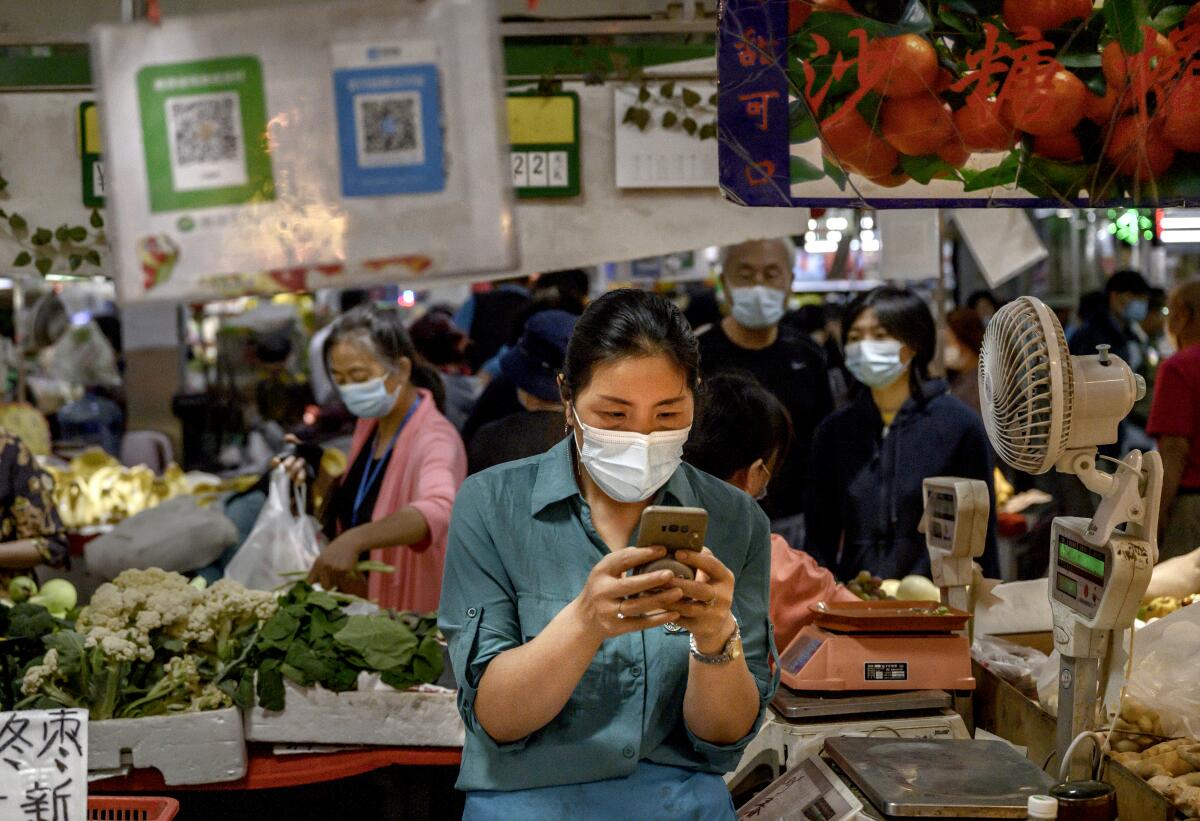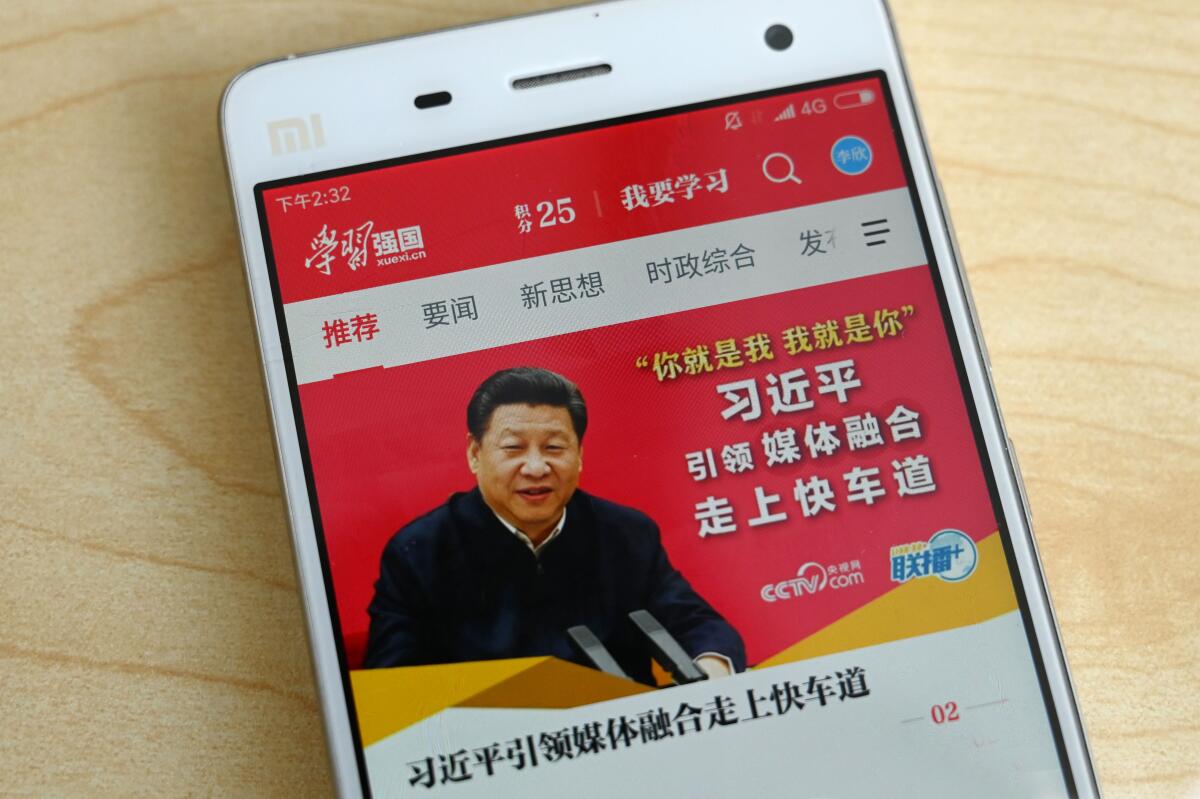How Chinaâs Xi Jinping app went from pushing nationalism to scamming women

BEIJING â They seemed like caring, trustworthy men: military officers and government officials chatting on an app dedicated to studying the words of Chinese President and Communist Party leader Xi Jinping.
But they had other intentions.
In recent months, local media and public security bureaus across China have reported a surge of mostly men targeting women in romance scams using Study Xi, Strong Nation, an app created by the Communist Partyâs propaganda department in 2019 to promote study of âXi Jinping Thought.â
The scammers duped victims by claiming their official positions prevented them from using social media or normal dating apps. Instead, they chatted daily on Study Xi, Strong Nation, where many civil servants, teachers, employees of state-owned companies and bureaucrats have been required to score points by studying âXi Jinping Thought.â
After gaining the confidence of mostly middle-aged, single women, the Study Xi scammers would lure their targets into lucrative investment schemes on shady online platforms. In some cases, the victims transferred millions of renminbi (the official currency of China) before realizing theyâd been tricked, according to a report from Zhejiang province that has since been deleted.

The government has tried to erase such revelations. Similar media and police reports of Study Xi scams in Sichuan, Guangxi, Guangdong, Shanghai, Shandong and Hubei have been censored.
âWhen a scamming gang sets its sights on Study Xi, Strong Nation, a new script appears on the pig-slaughter plate,â said a police officer in a video warning about the scams. He was using Chinese slang in which unwitting victims are compared to pigs slowly fattened with trust, then suddenly led to the slaughter.
It is an ironic, if embarrassing, twist in the story of a digital indoctrination app that has been called the Xi-era version of Mao Zedongâs Little Red Book â a tool of ideological control that has been subverted for sinister purposes. It underscores a broader online and telephone fraud problem that also has worrying implications for privacy as police expand surveillance of cellphones.

The Xi app gamified study of the presidentâs teachings, awarding points for frequent log-ins, time spent reading and watching videos of Xiâs speeches, and for taking quizzes on âXi Jinping Thought.â Scores were kept in competition on public leaderboards that sometimes became part of employeesâ work performance reviews.
It soon became the most downloaded app in China, drawing international media attention for its coercion of performed patriotism as well as its surveillance potential. A security 2019 audit by the Open Technology Fund found that Study Xi contained code amounting to a digital backdoor that essentially allowed âcomplete administrator-level access to a userâs phone.â
The app was also sending detailed daily logs of user activity and could scan phones to find other apps, including foreign ones such as WhatsApp, Kakao Talk, Facebook Messenger and Skype.
Having such international phone apps has led to harsh consequences, notably in Chinaâs far western Xinjiang region, where Uyghurs and other ethnic minorities found to have them through intense police surveillance have been detained in âre-educationâ camps. Many had committed no crimes.
Such treatment has so far not extended to the Han Chinese majority outside Xinjiang. But contact with foreign websites and overseas networks has already become a red flag in Chinaâs battle against digital fraud. According to a 2020 report on countering digital fraud by the China Academy of Information and Communications Technology, a government think tank that reports to the Ministry of Industry and Information Technology, more than 95% of digital scammers contact their targets from IP addresses outside mainland China.
Many scammers belong to Chinese organized crime networks based in Southeast Asia, said a police officer from Hunan who had made online videos warning of the Xi app scams. He asked to not be named because he did not have permission to speak with media. These Mandarin-speaking networks are involved not only in digital scams, he said, but also online gambling, drug and wildlife trafficking, and other kinds of illicit activity.

In April, around the same time reports of the Study Xi scams emerged, Xi called for a crackdown on telecom and online fraud. A new app quickly became Chinaâs No. 1 download: National Anti-Fraud Center, produced by the Ministry of Public Securityâs criminal investigation department that purportedly protects users from scammers by screening their messages, calls and other apps.
Launched in March, the anti-fraud app has been downloaded 178 million times on Android and an unknown number of times on iOS, which doesnât display a download count. It has more than 35,000 mostly negative reviews on Chinaâs App Store, many of them complaining that they were coerced into installing the app by their workplaces, schools, local police and even vaccine administrators.
âWhile receiving a vaccine in Shenzhen they said I couldnât get the vaccine if I didnât download the anti-fraud app!!!â wrote a reviewer on April 2. âThis isnât even a health bureau app. This kind of download by violence really leaves me speechless.â
âTruly a terrible experience of forcible promotion, especially when kindergarten teachers make this a task for parents and demand that they send screenshots of the downloadâŚ. This feeling is too disgusting!â wrote a user on June 3.
Many others complained that the anti-fraud app was slow, took up large amounts of memory, demanded too many permissions and did not protect their phones from receiving scammersâ calls.
The public security department in charge of countering fraud did not answer multiple calls from The Times. But Chinese state media have reported on officials and police enforcing anti-fraud app downloads.
In Guangdongâs Qingyuan city, 300 Communist Party officials partnered with police and neighborhood workers to knock on doors to promote the anti-fraud app home-by-home, according to state media. In Shanghai, police used more carrot than stick, bringing three police dogs to a plaza and offering passersby a chance to pet them if they downloaded the anti-fraud app.
The promotion of the app comes amid a state crackdown on tech companies over digital privacy concerns. In May, China implemented new regulations that defined for the first time what personal information was ânecessaryâ for apps to collect and outlawed excessive data collection. Within a few weeks, regulators had taken 90 apps offline for âirregular collection of personal information,â including apps made by some of Chinaâs most powerful tech companies.
The police anti-fraud app seems to do exactly what the government is trying to stop tech companies from doing. It requires that users submit their phone number, real name, ID number, home address and facial recognition data. It also requires access to the deviceâs contacts, messages, apps, photos, visited websites, music, videos, recordings, social media accounts, transactions, calls, microphone, camera, screenshots, location and storage.
While Chinaâs fraud problems are real, many reviewers of the anti-fraud app are questioning whether the true intention of the app is protection or surveillance â or just another example of incompetent âformalismâ among Chinese bureaucrats eager to meet performance quotas by producing high download numbers.
From that perspective, whether the app actually reduces fraud matters less than the illusion of many users joining an anti-fraud campaign, just as whether people truly believe in âXi Jinping Thoughtâ mattered less than having millions of users score points on Xi quizzes every day.
Meanwhile, reviews of the anti-fraud app have continued to pour in, many of them just one sarcastic line echoing comments posted on the Xi app two years ago: âThis is a voluntary download.â
Ziyu Yang of The Timesâ Beijing bureau contributed to this report.
More to Read
Sign up for Essential California
The most important California stories and recommendations in your inbox every morning.
You may occasionally receive promotional content from the Los Angeles Times.











